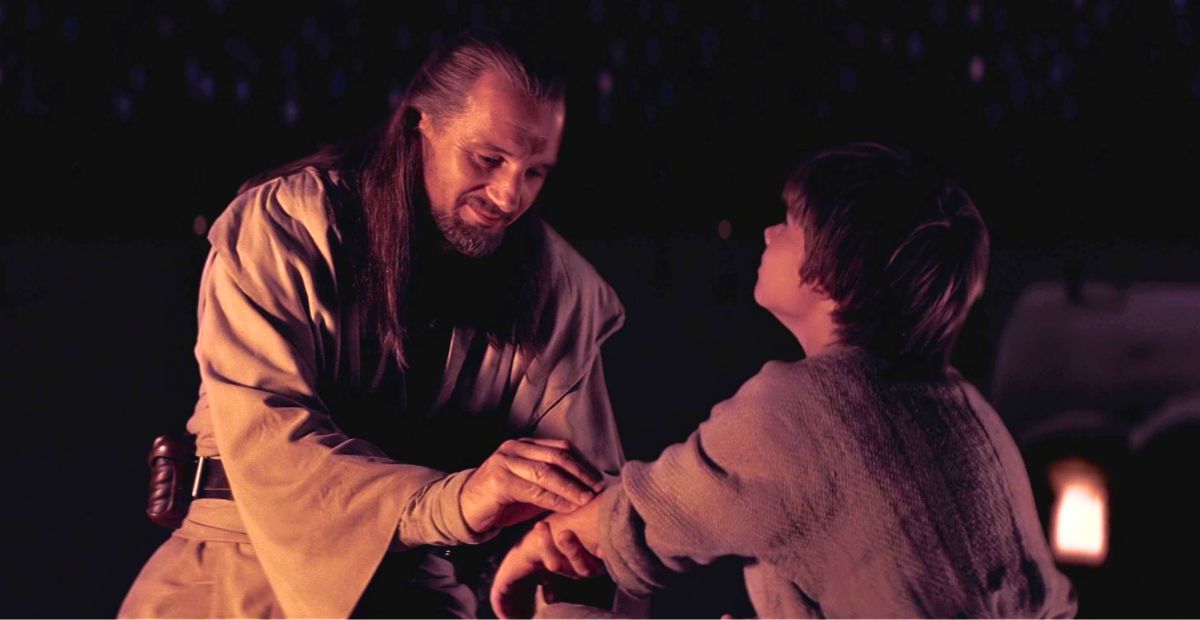Back in the original trilogy, we were introduced to the Force as pure mysticism. It felt spiritual, powerful, and like something anyone could connect to if they truly believed. But when The Phantom Menace introduced midi-chlorians, that sense of mystery started to fade.
Suddenly, the Force wasn’t just an energy that connected everything—it was tied to biology. Microscopic organisms living in your cells determined how strong you could be in the Force. And ever since that moment, I don’t think the fandom has ever fully accepted it.
1. It Made the Force Feel Like Science, Not Spirituality
When we were first introduced to the Force, it felt like something mystical—an unseen energy that flowed through all living things.
In the original trilogy, the Force was something you could believe in. It was mystical, almost spiritual—an energy that connected everything and could be felt by anyone, no matter who they were. As seen in A New Hope, we’re shown this many times—like when Obi-Wan trains Luke to rely on the Force while using a lightsaber, or later when he tells Luke to “use the Force, Luke. Let go” and trust it over technology. Luke turns off his targeting computer during the Death Star trench run, relying purely on his connection to something greater. He wasn’t the most trained or powerful Jedi—he just had faith. And that moment made the Force feel like something anyone could tap into, not something you needed a blood test to access.
But when midi-chlorians were introduced, that all shifted. Suddenly, the Force wasn’t about belief or connection—it was about biology. Your potential was tied to microscopic organisms in your cells. It felt like someone took the soul out of the Force and replaced it with a lab report. That change made it feel colder, less magical, and honestly, less meaningful.
2. Midi-chlorians Took the Choice Out of the Force
It changed how we looked at the Jedi forever. Instead of being something anyone could connect to, the Force suddenly became something you had to be born with. It turned the Jedi Order into an exclusive club, where access depended on your biological stats, not your mindset, values, or dedication.
I get why midi-chlorians were brought in—mainly to build up Anakin as the Chosen One. He’s the person with the most potential in the galaxy, and that’s supposed to mean something. But they could’ve told that story in a much simpler way. Just say, “This kid has incredible potential in the Force”—and leave it at that. Instead, they gave him the highest M-count ever recorded, and suddenly, the Force became something tied to a number.
Honestly, we could’ve had a moment where Anakin steps into the Jedi Council chamber and every Jedi just feels how strong his connection to the Force is. That would’ve said more than any blood test ever could. It reminds me of The Force Unleashed, when Vader slaughters a surviving Jedi and the man’s son rushes in, grabbing Vader’s lightsaber to protect his father. In that moment, Vader doesn’t check for M-counts—he just senses the boy’s raw potential.
That’s exactly what happens in A New Hope, too—when Luke taps into the Force during the trench run, and Vader says, “The Force is strong with this one.” No charts, no numbers—just instinct. That’s how it should be. You don’t need to measure the Force. You feel it.
That change sent a clear message: if you didn’t have a high M-count, you didn’t matter. People across the galaxy who believed in the Force, who lived by it, suddenly didn’t “qualify” anymore. And just like that, something that once felt open and spiritual now felt like a closed system only a few could access.
3. Now Everyone’s Force Power Feels Like a Stat Sheet
As I mentioned right above, the M-count doesn’t just define someone’s Force power—it has turned into something much bigger. Once midi-chlorians were introduced, we didn’t just lose the mystery—we started turning the Force into a numbers game. Suddenly, you could measure how powerful someone should be based on how many tiny organisms they had in their blood. Anakin had the highest count ever recorded, and from there, it just snowballed.
We started seeing characters ranked like they were on a leaderboard. Debates about who’s stronger, fan-made power tiers, and Force “stats” became a regular part of the conversation. And when that kind of thinking takes over, it’s hard to focus on the deeper parts of what made the Force feel special in the first place.
The Force was never meant to be about numbers—it was about connection, instinct, emotion, and balance. But once you assign it a number, it becomes harder to see it as anything more than a measurable power level.

